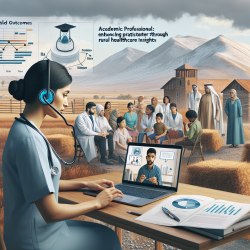Introduction: The Potential of Nutraceuticals in Child Development
In the realm of child development and therapy, practitioners are constantly seeking innovative approaches to enhance outcomes. One emerging field that holds promise is the use of nutraceuticals—products derived from food sources with additional health benefits beyond basic nutrition. The research article "Nutraceuticals: Opening the Debate for a Regulatory Framework" by Santini et al. (2018) offers a comprehensive exploration of this topic, highlighting the need for a clearer regulatory framework and substantiated health claims. This blog post aims to distill key insights from the research and discuss how practitioners can leverage these findings to improve their practice.
Understanding Nutraceuticals: A New Frontier
Nutraceuticals occupy a unique space between food and pharmaceuticals, often referred to as "pharma-foods." They are touted for their potential to prevent and treat diseases, particularly in individuals not yet eligible for conventional pharmaceutical therapies. However, the lack of a standardized definition and regulatory framework poses challenges. The research underscores the importance of establishing clear guidelines to differentiate nutraceuticals from food supplements and pharmaceuticals, ensuring safety and efficacy through clinical data.
Implications for Practitioners: Integrating Nutraceuticals into Therapy
For practitioners in speech-language pathology and related fields, the insights from this research can be transformative. Here are some actionable steps:
- Stay Informed: Keep abreast of the latest research on nutraceuticals and their potential benefits for child development. Understanding the mechanisms of action and safety profiles is crucial.
- Advocate for Regulation: Support efforts to establish a regulatory framework that ensures the safety and efficacy of nutraceuticals. This can lead to more reliable products and better outcomes for children.
- Collaborate with Healthcare Professionals: Work closely with nutritionists and healthcare providers to integrate nutraceuticals into treatment plans where appropriate, ensuring a holistic approach to child health.
- Educate Parents and Caregivers: Provide clear information to parents about the potential benefits and risks of nutraceuticals, helping them make informed decisions about their child's health.
Encouraging Further Research
The research by Santini et al. highlights the need for more clinical studies to substantiate the health claims of nutraceuticals. Practitioners can play a pivotal role in this by:
- Participating in Research: Engage in or support research studies that explore the effects of nutraceuticals on child development, contributing valuable data to the field.
- Sharing Observations: Document and share observations from practice regarding the use of nutraceuticals, providing anecdotal evidence that can guide future research.
Conclusion: A Call to Action
As the demand for nutraceuticals grows, practitioners have an opportunity to lead the charge in advocating for a more structured approach to their use. By integrating insights from research and collaborating with stakeholders, we can ensure that nutraceuticals become a safe and effective tool in enhancing child development outcomes.
To read the original research paper, please follow this link: Nutraceuticals: opening the debate for a regulatory framework.










